 Petzlover
Petzlover Thai is originated from Thailand but Toyger is originated from United States. Both Thai and Toyger are having almost same weight. Thai may live 5 years more than Toyger. Both Thai and Toyger has same litter size. Thai requires Low Maintenance. But Toyger requires Moderate Maintenance
Thai is originated from Thailand but Toyger is originated from United States. Both Thai and Toyger are having almost same weight. Thai may live 5 years more than Toyger. Both Thai and Toyger has same litter size. Thai requires Low Maintenance. But Toyger requires Moderate Maintenance
 The Thai cat is also referred to as the Wichien Maat. It is an old cat breed descended from the cats of Thailand.
The Thai cat is also referred to as the Wichien Maat. It is an old cat breed descended from the cats of Thailand.
The Wichienmaat is a cat that was spoken of already centuries ago in a book. Over the years, the cat has remained much the same as its original breeding. Today this cat is popular in Thailand.
It was in the late 1800s that the Wichienmaat was imported to the West by British cat breeders, and the cats became known as ‘Siamese’.
Western breeders wanted to add in some other qualities to the cat and through selective breeding, they developed a finer-boned type of Siamese cat. Today some people refer to these cats as Old-Style Siamese, while others refer to them as Thais, but they are one and the same.
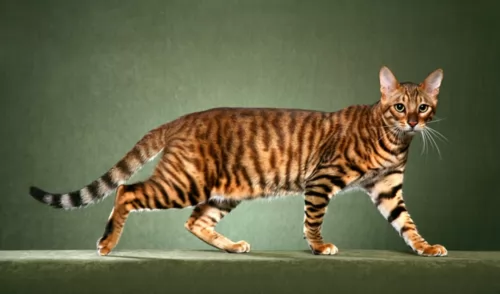 The Toyger is a domestic cat developed from breeding Shorthaired Tabbies to look like a small Tiger.
The Toyger is a domestic cat developed from breeding Shorthaired Tabbies to look like a small Tiger.
It has the striped coat of the Tiger. The person to develop the Toyger is Judy Sugden.
The unusual-looking cat has been recognized for registration by the International Cat Association in the 1990s. It was accepted as a full championship breed in 2007.
Today this designer cat is recognized by the ICA but not the Cat Fancier's Association.
 The Thai is a short-haired, glossy cat and comes in a variety of colors but no white.
The Thai is a short-haired, glossy cat and comes in a variety of colors but no white.
The soft, silky fur is a warm cream shade, much like the Siamese, with dark brown, black, smoky colored extremities.
The Thai is considered to be a medium-sized cat and he will weigh between 3 an 6kg. The body is lean, slender and muscular, the ears medium size with rounded tips and set wide apart. The eyes are are beautiful blue, large and slightly slanted.
Thai cats are curious, active, and intelligent. They are also social and vocal and are able to communicate to their human owners what they want.
They thrive on getting lots of attention from their humans and will even follow them around the house. They do well with children in the home when the children have been taught to be kind and respectful to animals.
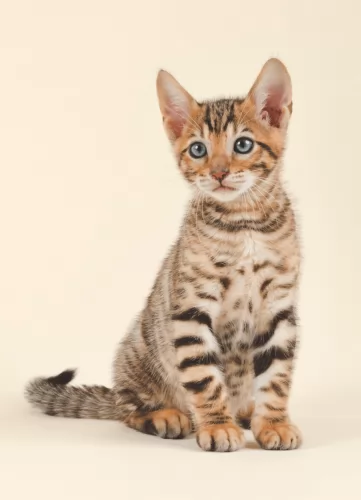 The Toyger is a medium to large-sized cat that can weigh between 5 and 9kg. As with any cat, with these newer kinds of cats, the size of the cat can vary.
The Toyger is a medium to large-sized cat that can weigh between 5 and 9kg. As with any cat, with these newer kinds of cats, the size of the cat can vary.
It is a shorthair cat that is quite a bit bigger than your regular cat. The coat of this mixed breed cat has markings similar to that of a tiger - vertical orange striping with rosettes.
The coat of the cat is short and he is a brown mackerel tabby with stripes being a dark brown to black. The eyes of the cat can be a blue, aquamarine, green, or gold.
These cats have a laid back disposition, and will comfortably slot into a busy household.
They are playful and intelligent and can be taught tricks and to walk on the lead.
This cat enjoys the company of people and will get on well with other pets too. People who have owned them say they are the most affectionate and loving cats there are and will enjoy being petted and pampered by their human family.
They get on well in busy households where there are children and other pets. They’re super smart and can be trained with ease.
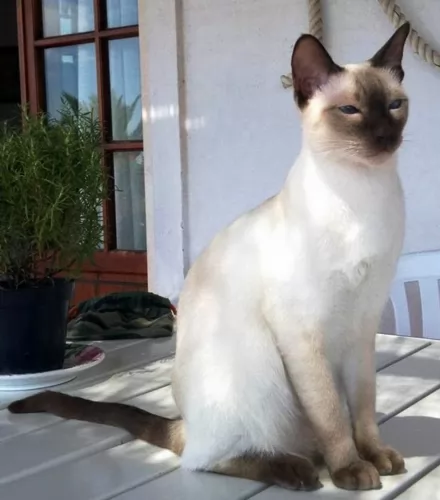 The Thai cat is social and friendly and enjoys time spent with his human family. They don’t like to be left alone for long periods of time and it just might be a good idea to have a feline friend for this cat.
The Thai cat is social and friendly and enjoys time spent with his human family. They don’t like to be left alone for long periods of time and it just might be a good idea to have a feline friend for this cat.
He is also a vocal cat and lets you know his feelings and certainly when he wants his food. The Thai wants to be your friend and companion and he will thrive in any kind of home when he is made to feel important and loved.
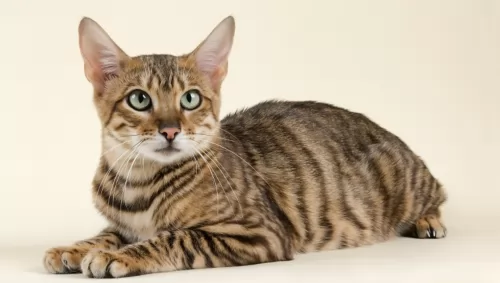 Toygers are expensive cats and there aren’t many breeders in the world. If you do decide to invest in a Toyger, he will need careful looking after, after all, you've spent a lot of money on him.
Toygers are expensive cats and there aren’t many breeders in the world. If you do decide to invest in a Toyger, he will need careful looking after, after all, you've spent a lot of money on him.
Diet is of absolute importance to keep such a cat healthy. The right environment is also important as cats and dogs for that matter too, can become ill and depressed if they find themselves in homes where they are unloved and abused.
Don't get a cat if you aren't prepared to love and care for him. Because the question is then 'why get a cat?'
 These cats are known for their good health. Just because he is considered healthy, you can't ignore looking out for signs that he may be in distress.
These cats are known for their good health. Just because he is considered healthy, you can't ignore looking out for signs that he may be in distress.
There are actually a whole lot of common cat illnesses your cat could succumb to, so you want to be sure you recognize some of the signs such a vomiting, diarrhea, lethargy, and battling to urinate. Make sure that the eyes are always bright and clear and that he is his active self.
Have your Thai cat vaccinated against the deadly cat diseases that there are. You will also need to have your cat dewormed. Speak to your vet about the best way to prevent fleas.
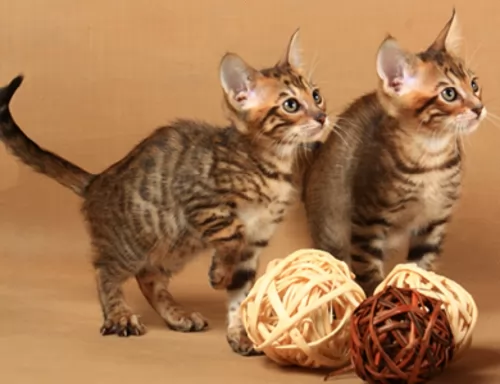 Just like in human beings, obesity can reduce the lifespan of your cat. Make sure you keep your Toyger’s weight under control.
Just like in human beings, obesity can reduce the lifespan of your cat. Make sure you keep your Toyger’s weight under control.
These cats are considered to be fairly healthy. He can be predisposed to some of the same cat conditions that the Bengal and Domestic Shorthair face.
When your Toyger shows any signs of illness, get him to the vet. Some of the common health problems your Toygers might have to contend with include obesity and heart murmurs.
A heart murmur is an abnormal heart sound, and is caused by turbulent blood flow within the heart. When you vet examines your cat, a heart murmur is detected when the vet listens to your cat's heart with a stethoscope. The vet will discuss with you the way forward for your cat.
If you get a Toyger kitten, you will have to make sure he is up to date with his vaccinations. This is part of being a responsible cat owner.
The breeder will have a record of his vaccinations and will hand this over to you.
At 6 – 8 weeks kittens start with their first injections which include vaccinations for distemper, feline rhinotracheitis, and feline calici virus.
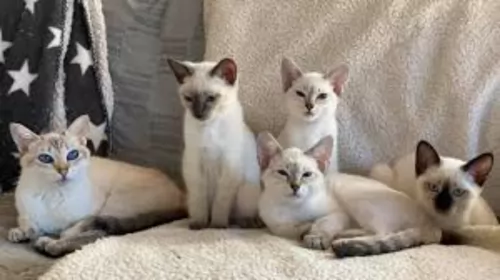 You’ll see your Thai cat preening and grooming, but he will still need to have the silky coat brushed gently to keep it shiny and healthy.
You’ll see your Thai cat preening and grooming, but he will still need to have the silky coat brushed gently to keep it shiny and healthy.
The brushing will make him happy as he just loves the attention, and it is good for the cat’s fur – to remove dust and loose hairs.
Your Thai cat is a scratcher just like any other cat, and if you don’t want to have your furniture scratch, invest in a scratching post.
Examine the inside of your cat’s ears to make sure they are clear of dirt and wax that could cause infection.
Some people say you should brush your cat’s teeth, but this can be too traumatic for your cat. Pets have always done well without their teeth being brushed. It can frighten your cat so much, he’ll want to scratch you.
Your Thai is an active, energetic cat, and you will want to provide him with a cat tree for climbing.
Provide your cat with feeding- and drinking bowls, litter box, warm, soft bed and toys to keep him occupied. It is always a good idea to put a collar on your pet and an ID disc in case he runs away.
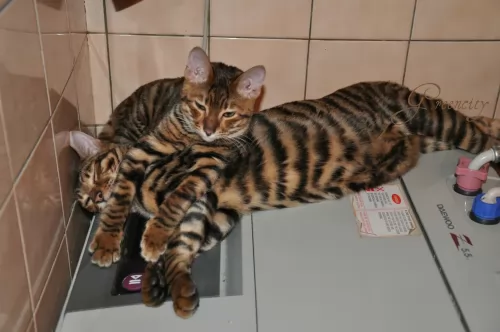 Toygers should be brushed weekly and have their nails trimmed regularly. As with all domesticated cats, you should check inside his ears to make sure they don’t become clogged with dirt and wax.
Toygers should be brushed weekly and have their nails trimmed regularly. As with all domesticated cats, you should check inside his ears to make sure they don’t become clogged with dirt and wax.
These are smart cats so they will need to be provided with attention in the form of clever games and toys that get him thinking.
Toygers need to be fed much like any other domestic cat. The most important thing to remember when feeding a cat is that they are carnivores and they require meaty food high in protein.
Speak to your vet about the absolute necessity of getting your cat’s diet right. For your convenience, cat food manufacturers have brought out many excellent cat foods that cater to the time of life your cat is in.